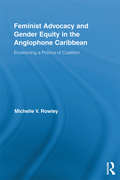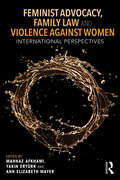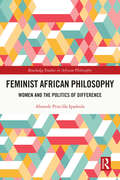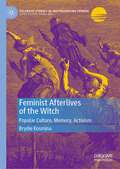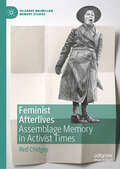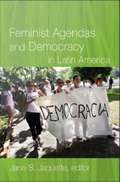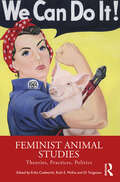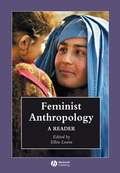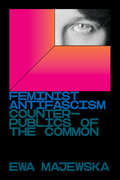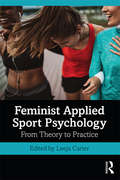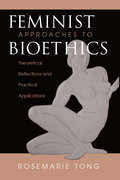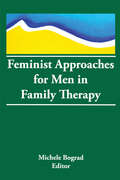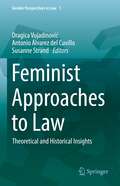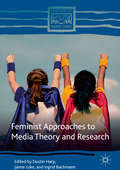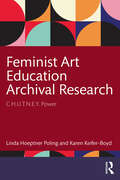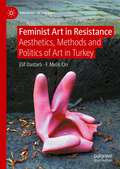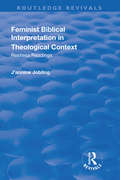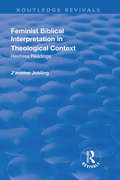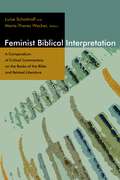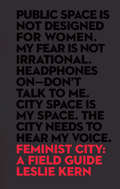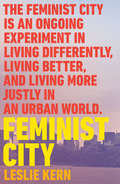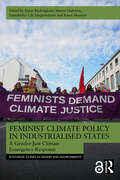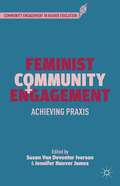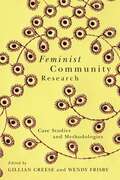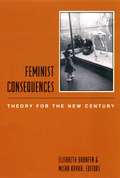- Table View
- List View
Feminist Advocacy and Gender Equity in the Anglophone Caribbean: Envisioning a Politics of Coalition (Routledge International Studies of Women and Place)
by Michelle V. RowleyThis book uses the Anglophone Caribbean as its site of critique to explore two important questions within development studies. First, to what extent has the United Nations' call to implement gender-mainstreaming projects resulted in the realization of gender equity for women within developing societies? Second, does gender-mainstreaming have the conceptual, operational, and technical capacities to address the centrality of the body in 21st-century lobbies for gender equity? In answering these questions, Rowley examines such issues as reproductive rights and equity, sexual harassment, and sexual minorities' rights.
Feminist Advocacy, Family Law and Violence against Women: International Perspectives (Routledge Studies in Development and Society)
by Ann Elizabeth Mayer Mahnaz Akhami Yakın ErtürkAround the world, discriminatory legislation prevents women from accessing their human rights. It can affect almost every aspect of a woman's life, including the right to choose a partner, inherit property, hold a job, and obtain child custody. Often referred to as family law, these laws have contributed to discrimination and to the justification of gender-based violence globally. This book demonstrates how women across the world are contributing to legal reform, helping to shape non-discriminatory policies and to counter current legal and social justifications for gender-based violence. The book takes case studies from Brazil, India, Iran, Lebanon, Nigeria, Palestine, Senegal, and Turkey, using them to demosntrate in each case the varied history of family law and the wide variety of issues impacting women’s equality in legislation. Interviews with prominent women's rights activists in three additional countries are also included, giving personal accounts of the successes and failures of past reform efforts. Overall, the book provides a complex global picture of current trends and strategies in the fight for a more egalitarian society. These findings come at a critical moment for change. Across the globe, family law issues are contentious. We are simultaneously witnessing an increased demand for women’s equality and the resurgence of fundamentalist forces that impede reform, invoking rules rooted in tradition, culture, and interpretations of religious texts. The outcome of these disputes has enormous ramifications for women’s roles in the family and society. This book tackles these complexities head on, and will interest activists, practitioners, students, and scholars working on women's rights and gender-based violence.
Feminist African Philosophy: Women and the Politics of Difference (Routledge Studies in African Philosophy)
by Abosede Priscilla IpadeolaThe book argues that women's perspectives and gender issues must be mainstreamed across African philosophy in order for the discipline to truly represent the thoughts of Africans across the continent. African philosophy as an academic discipline emerged as a direct challenge to Western and Eurocentric hegemonies. It sought to actualize the project of decolonization and to contribute African perspectives to global discourses. There has, however, been a dominance of male perspectives in this field of human knowledge. This book argues that African philosophy cannot claim to have liberated people of African descent from marginalization until the androcentric nature of African philosophy is addressed. Key concepts such as Ujamaa, Negritude, Ubuntu, Consciencism, and African Socialism are explored as they relate to African women's lives or as models of inclusion or exclusion from politics. In addition to offering a feminist critique of African philosophy, the book also discusses topics that have been consistently overlooked in African philosophy. These topics include sex, sexuality, rape, motherhood, prostitution, and the low participation of women in politics. By highlighting the work of women feminist scholars such as Oyeronke Oyewumi, Nkiru Nzegwu, Ifi Amadiume, Amina Mama, and Bibi Bakare-Yusuf, the book engages with African philosophy from an African feminist viewpoint. This book will be an essential resource for students and researchers of African philosophy and gender studies.
Feminist Afterlives of the Witch: Popular Culture, Memory, Activism (Palgrave Studies in (Re)Presenting Gender)
by Brydie KosminaThe book investigates the witch as a key rhetorical symbol in twentieth- and twenty-first century feminist memory, politics, activism, and popular culture. The witch demonstrates the inheritance of paradoxical pasts, traversing numerous ideological memoryscapes. This book is an examination of the ways that the witch has been deployed by feminist activists and writers in their political efforts in the twentieth century, and how this has indelibly affected cultural memories of the witch and the witch trials, and how this plays out in popular culture representations of the symbol through the twentieth and twenty-first centuries. Consequently, this book considers the relationship between popular culture and media, activist politics, and cultural memory. Using hauntological theories of memory and temporality, and literary, screen, and cultural studies methodologies, this book considers how popular culture remembers, misremembers, and forgets usable pasts, and the uses (and misuses) of these memories for feminist politics. Given the ubiquity of the witch in popular culture, politics and activism since 2016, this book is a timely examination of the range of meanings inherent to the figure, and is an important study of how cultural symbols like the witch inherit paradoxical memories, histories, and politics. The book will be valuable for scholars across disciplines, including witchcraft studies, feminist philosophy and history, memory studies, and popular culture studies.
Feminist Afterlives: Assemblage Memory in Activist Times (Palgrave Macmillan Memory Studies)
by Red ChidgeyThis book interrogates why feminist memories matter. Feminist Afterlives explores how the images, ideas and feelings of past liberation struggles become freshly available and transmissible. In doing so, Red Chidgey examines how popular feminist memories travel as digital and material resources across protest, heritage, media, commercial and governmental sites, and in connection with the concerns and conditions of the present. Central case studies track repeated invocations to militant suffragettes and the We Can Do It! post-feminist icon over time and space. Assembling interviews, archival research and ethnographic accounts with provocative examples drawn from postfeminist media culture, a UNESCO heritage bid, protest at the London 2012 Olympic Games, and activist remembrance in zines and blogs, this is a broad-ranging study of ‘restless’ feminist pasts – both real and imagined. Richly researched and argued, this volume offers an original framework of ‘assemblage memory’ and sets out a new research agenda for the intersections between everyday activism, protest, and memory practices.
Feminist Agendas and Democracy in Latin America
by Jane S. JaquetteLatin American women's movements played important roles in the democratic transitions in South America during the 1980s and in Central America during the 1990s. However, very little has been written on what has become of these movements and their agendas since the return to democracy. This timely collection examines how women's movements have responded to the dramatic political, economic, and social changes of the last twenty years. In these essays, leading scholar-activists focus on the various strategies women's movements have adopted and assess their successes and failures. The book is organized around three broad topics. The first, women's access to political power at the national level, is addressed by essays on the election of Michelle Bachelet in Chile, gender quotas in Argentina and Brazil, and the responses of the women's movement to the "Bolivarian revolution" in Venezuela. The second topic, the use of legal strategies, is taken up in essays on women's rights across the board in Argentina, violence against women in Brazil, and gender in the work of the Truth and Reconciliation Commission in Peru. Finally, the international impact of Latin American feminists is explored through an account of their participation in the World Social Forum, an assessment of a Chilean-led project carried out by women's organizations in several countries to hold governments to the promises they made at international conferences in Cairo and Beijing, and an account of cross-border organizing to address femicides and domestic abuse in the Jurez-El Paso border region. Jane S. Jaquette provides the historical and political context of women's movement activism in her introduction, and concludes the volume by engaging contemporary debates about feminism, civil society, and democracy. Contributors. Jutta Borner, Mariana Caminotti, Alina Donoso, Gioconda Espina, Jane S. Jaquette, Beatriz Kohen, Julissa Mantilla Falcn, Jutta Marx, Gabriela L. Montoya, Flvia Piovesan, Marcela Ros Tobar, Kathleen Staudt, Teresa Valds, Virginia Vargas
Feminist Animal Studies: Theories, Practices, Politics
by Erika Cudworth Ruth E McKie Di TurgooseThis book explores human–animal relations and species-based domination at the intersection of feminism with critique of our domination and exploitation of nonhuman animals, in conversation with power dynamics around coloniality and race, class, sexuality and embodiment. The collection demonstrates the continued vital importance of feminism – conceptually and theoretically, methodologically and politically – to the development of animal studies. Feminism has made an incisive critique of the ways in which gender and other intersecting differences and inequalities are constitutive of our destructive, exploitative and often violent relationships with nonhuman worlds. An international group of scholars and activists showcase new work, revisiting and extending established debates while negotiating new paths. Amongst the issues addressed in this collection will be questions of animal being and animal rights, caring relations, the relationships between activism and theory, interspecies sexual violence, tension in the animal defence movement around body politics, gender politics and professionalisation, different spaces of gender and animal relations from social media to sexology, safe spaces and sanctuaries, spaces of home – both in times of ‘business-as-usual’ and in times of lockdown. This multidisciplinary volume will be essential reading to students and academics working in the fields of cultural studies, criminology, geography, history, law, philosophy, politics and sociology, with interest in gender, environmentalism and animal studies. The editors work in the School of Applied Social Sciences at De Montfort University, Leicester, UK, and share interests in gender and species violence, environmental harms, social justice matters and intersected inequalities.
Feminist Anthropology: A Reader
by Ellen LewinFeminist Anthropology surveys the history of feminist anthropology and offers students and scholars a fascinating collection of both classic and contemporary articles, grouped to highlight key themes from the past and present. Offers vibrant examples of feminist ethnographic work rather than synthetic overviews of the field. Each section is framed by a theoretical and bibliographic essay. Includes a thoughtful introduction to the volume that provides context and discusses the intellectual foremothers of the field, including Margaret Mead, Ruth Landes, Phyllis Kaberry, and Zora Neale Hurston.
Feminist Antifascism: Counterpublics of the Common
by Ewa MajewskaFeminism as the bulwark against fascismIn this exciting, innovative work, Polish feminist philosopher Ewa Majewska proposes a specifically feminist politics of antifascism. Mixing theoretical discussion with engaging reflections on personal experiences, Majewska proposes what she calls “counterpublics of the common” and “weak resistance,” offering an alternative to heroic forms of subjectivity produced by neoliberal capitalism and contemporary fascism.
Feminist Applied Sport Psychology: From Theory to Practice
by Leeja CarterWith an emphasis on women and transwomen athletes and exercisers of color, Feminist Applied Sport Psychology: From Theory to Practice introduces the reader to feminist, black feminist, and womanist sport psychology, offering an alternative and powerful approach to working with athletes. Covering core concepts, applied skills, and research methods, the book includes useful features throughout, such as discussion questions and definitions of key terms. It is organized into three sections covering, firstly, feminist theory, history, movements, and their importance in applied sport psychology; secondly, the intersection of race, class, and gender, and the integration of intersectional considerations into sport psychology; and finally, in-depth case studies of feminist sport psychology in action, each of which offers strategies for best practice. Feminist Applied Sport Psychology: From Theory to Practice is important reading for feminist-centred students and practitioners in performance and sports domains, and exercise psychology and anybody with an interest in feminist approaches to working with women of diverse backgrounds.
Feminist Approaches To Bioethics: Theoretical Reflections And Practical Applications
by Rosemarie Putnam TongNo other cluster of medical issues affects the genders as differently as those related to procreationcontraception, sterilization, abortion, artificial insemination, in-vitro fertilization, surrogate motherhood, and genetic screening. Rosemarie Tongs approach to feminist bioethics serves as a catalyst to bring together different feminist voices in hope of actually doing something to make gender equity a present reality rather than a mere future possibility. No other cluster of medical issues affects the genders as differently as those related to procreationcontraception, sterilization, abortion, artificial insemination, in vitro fertilization, surrogate motherhood, and genetic screening. Yet, the moral diversity among feminists has led to political fragmentation, foiling efforts to create policies that are likely to serve the interests of the largest possible number of women. In this remarkable book, Rosemarie Tong offers an approach to feminist bioethics that serves as a catalyst, bringing together the varied perspectives on choice, control, and connection. Emphasizing the complexity of feminist debates, she guides feminists toward consensus in thought, cooperation in action, and a world that would have no room for domination and subordination.Tong fairly and comprehensively presents the traditions of both feminist and non-feminist ethics. Although feminist approaches to bioethics derive many insights from nonfeminist ethics and bioethics, Tong shows that their primary source of inspiration is feminist ethics, leading them to ask the so-called woman question in order to raise womens consciousness about the systems, structures, and relationships that oppress them. Feminist bioethicists are, naturally, focused on acting locally in the worlds of medicine and science. Their different feminist voices must be raised at the policy table with one message in order to actually do something to make gender equity a present reality rather than a mere future possibility. Inability to define a plan that guarantees liberation for all women must not prevent feminists from offering a plan that promises to improve the estates of many women. Otherwise, a perspective less appealing to women may fill the gap.
Feminist Approaches for Men in Family Therapy
by Michele BogradThis book is the first of its kind to address the treatment of men in marital and family therapy from a political or feminist perspective. Feminist Approaches for Men in Family Therapy is an important and provocative addition to the field of family therapy and psychotherapy and works to deepen the understanding of men by using more traditional approaches. Timely and relevant to today’s interest in men’s issues, this book develops and demonstrates applications of treatment methods in straightforward prose from a variety of family therapy models. These techniques and methods enable anyone working with men--beginning and advanced clinicians, regardless of clinical preference or loyalty--to have a more effective practice with men. Truly reflecting its title, this provocative volume offers new ways of conceptualizing male development and the dilemmas of men in therapy, while providing exemplars of the wide range of clinical work this perspective enriches. Chapters concisely summarize the major benefits and limitations of conventional approaches to treating men and provide beginning conceptualizations of treatment issues with men that are grounded in social theory, sensitivity to power issues and the social context, and shifting cultural definitions of masculinity, femininity, and the nature of marriage. Other chapters employ the exciting and germane concepts of social constructionism to analyze belief systems about men and how cultural ideals shape and limit the personal development of men. An ideal resource for all therapists striving for excellence in treating men.
Feminist Approaches to Law: Theoretical and Historical Insights (Gender Perspectives in Law #1)
by Dragica Vujadinović Antonio Álvarez del Cuvillo Susanne StrandThis book raises awareness about gender perspective in political and legal theories and historical analysis. The impacts of feminist political and legal theories, as well as critical legal studies, have been embedded in all the papers in different ways and degrees. Differences among feminist political and legal ideas are visible in the different approaches. The ongoing issue of defining gender, for example, is a recurring theme in the texts. Some papers question the binary basis of the gender issue and the notion of gender as such, while others start from the binary dichotomy and attempt to expand the consideration towards a multi-dimensional understanding of gender identities. The main focus is on a feminist reconsideration of all relevant fields of legal knowledge. The primary aim is to demystify the seemingly neutral character of legal norms and legal knowledge and highlight the power relations at different layers, beginning with male and female legal subjects of Western heredity (in terms of culture, ethnicity, and race), then moving on to different needs and power relations among female persons of different races and classes, and finally addressing differentiating gender relations and identities beyond the framework of the women-men binary codification, i.e., also taking into consideration the multiple options of intersex, transgender, queering, etc. Taking seriously the issue of the “maleness” of political and legal theories is indeed a challenging and relevant endeavor for legal scholars. The male bias is present not only throughout history but also in the present, given that our “universal” categories of political and legal thought are still overburdened by unequal power relations. It is also important to open our minds and knowledge production for a gender-sensitive and gender-competent intersectional approach, which would also include various queer-, race- and class-based considerations. These tasks should be of interest not only to critical legal scholars but also all those belonging to mainstream legal and political thought.
Feminist Approaches to Media Theory and Research (Comparative Feminist Studies)
by Dustin Harp Jaime Loke Ingrid BachmannFeminist Approaches to Media Theory and Research tackles the breadth and depth of feminist perspectives in the field of media studies through essays and research that reflect on the present and future of feminist research and theory at the intersections of women, gender, media, activism, and academia. The volume includes original chapters on diverse topics illustrating where theorization and research currently stand with regard to the politics of gender and media, what work is being done in feminist theory, and how feminist scholarship can contribute to our understanding of gender as a mediated experience with implications for our contemporary global society. It opens for discussion how the research, theory, and interventions challenge concepts of gender in mediated discourses and practices and how these fit into the evolving state of contemporary feminisms. Contributors engage with discussions about contemporary feminisms as they are understood in media theory and research, particularly in a field that has changed rapidly in the last decades with digital communication tools and through cross-disciplinary work. Overall, the book illustrates how the politics of gender operate within the current media landscapes and how feminist theorizing shapes academic inquiry of these landscapes.
Feminist Art Education Archival Research: C.H.U.T.N.E.Y. Power
by Karen Keifer-Boyd Linda Hoeptner PolingFeminist Art Education Archival Research: C.H.U.T.N.E.Y. Power explores the National Art Education Association’s (NAEA) Women’s Caucus’ histories of trailblazing feminist art education research, leadership, and policy activism.From archival research, specifically delving into the NAEA Women’s Caucus Archive at The Pennsylvania State University, this led to interviews with feminist activists in art education. The book draws attention to the activism of the NAEA Women’s Caucus contextualized within tenets of critical race feminism, which calls for organizational accountability from critical examination of hegemonic structures and practices that privilege white patriarchal colonialism and serves as a structure to deconstruct, interrogate, disrupt, and reimagine inequities that exist in art education, and all of education.Feminist Art Education Archival Research: C.H.U.T.N.E.Y. Power is a unique text ideal for feminist organizations, gender studies research, and art educators at all levels of teaching from preK to higher education, and is an ideal companion text for post-secondary art education, women’s studies, leadership, and other related areas.
Feminist Art in Resistance: Aesthetics, Methods and Politics of Art in Turkey (Sociology of the Arts)
by F. Melis Cin Elif DastarlıThis book provides a thorough interdisciplinary analysis of the ways in which artists have engaged with political and feminist grassroots movements to characterise a new direction in the production of feminist art. The authors conceptualise feminist art in Turkey through the lens of feminist philosophy by offering a historical analysis of how feminism and art interacts, analysing emerging feminist artwork and exploring the ways in which feminist art as a form opens alternative political spaces of social collectivities and dissent, to address epistemic injustices. The book also explores how the global art and feminist movements (particularly in Europe) have manifested themselves in the art scenery of Turkey and argues that feminist art has transformed into a form of political and protest art which challenges the hegemonic masculinity dominating the aesthetic debates and political sphere. It is an invaluable reading for students and scholars of sociology of art, gender studies and political sociology.
Feminist Biblical Interpretation in Theological Context: Restless Readings
by J'annine JoblingThis title was first published in 2002: The premise of the text is that there is a continuing need for biblical hermeneutic propsals and frameworks which emerge from the fields of both feminism and Christian theology. Feminism, the author asserts, demands not only the plotting of new routes but the restructuring of entire landscapes. As such this project, since it seeks to develop a feminist theological frame for meaning, impinges on and is impacted by innumerable inter-relating questions. In consequence, the scope of the book is necessarily both broad and interdisiplinary. The author, J'annine Jobling, uses particular texts and has articulated her own positions in response. In this way the embodied practice of thinking-in-relation is mirrored in the texts produced. This has determined the macro-structure of the thesis, which is based on an analysis of two feminist biblical scholars: Elisabeth Schussler Fionenza and Phyllis Trible. From this analysis Jobling identifies two primary principles for interpretation: rememberance and destabilization. This is a strategy which allows both materialist and post-structuralist perspectives to be set into play, each of which has vital contributions to make to feminist enterprises. The "Bible" is understood as matrix, as a set of discourses which are permeable to and intersect with other cultural discourses. The task of feminist interpretation is then to reconstitute the heterogenous biblical matrix in feminist horizons. A fundamental tenet of the book is that hermeneutics inhabits particular metaphysical constructs. Therefore, the argument extends from an interpretation of the Bible to an epistemological framework in which an eschatological hereneutic is recommended, to a metaphysical framework which takes eschatology as its structuring principle. The author argues that it is eschatology which can provide the resources for an ontological model radically disruptive of a metaphysics of presence, and in which it is possible to discern the traces of God. From this outermost limit of the author's hermeneutic investigations, the text returns to the centre: the feminist discursive community and develops a construct that the ekklesia, as a feminist deliberative space set oppositionally to structures, worldviews and idealogies operates on patriarchal logics. The relationship of this "imagined community" is compared to the Christian Church and scripture, ethics and gendered identity within a logic of equity.
Feminist Biblical Interpretation in Theological Context: Restless Readings (Routledge Revivals)
by J'annine JoblingThis title was first published in 2002: The premise of the text is that there is a continuing need for biblical hermeneutic propsals and frameworks which emerge from the fields of both feminism and Christian theology. Feminism, the author asserts, demands not only the plotting of new routes but the restructuring of entire landscapes. As such this project, since it seeks to develop a feminist theological frame for meaning, impinges on and is impacted by innumerable inter-relating questions. In consequence, the scope of the book is necessarily both broad and interdisiplinary. The author, J'annine Jobling, uses particular texts and has articulated her own positions in response. In this way the embodied practice of thinking-in-relation is mirrored in the texts produced. This has determined the macro-structure of the thesis, which is based on an analysis of two feminist biblical scholars: Elisabeth Schussler Fionenza and Phyllis Trible. From this analysis Jobling identifies two primary principles for interpretation: rememberance and destabilization. This is a strategy which allows both materialist and post-structuralist perspectives to be set into play, each of which has vital contributions to make to feminist enterprises. The "Bible" is understood as matrix, as a set of discourses which are permeable to and intersect with other cultural discourses. The task of feminist interpretation is then to reconstitute the heterogenous biblical matrix in feminist horizons. A fundamental tenet of the book is that hermeneutics inhabits particular metaphysical constructs. Therefore, the argument extends from an interpretation of the Bible to an epistemological framework in which an eschatological hereneutic is recommended, to a metaphysical framework which takes eschatology as its structuring principle. The author argues that it is eschatology which can provide the resources for an ontological model radically disruptive of a metaphysics of presence, and in which it is possible to discern the traces of God. From this outermost limit of the author's hermeneutic investigations, the text returns to the centre: the feminist discursive community and develops a construct that the ekklesia, as a feminist deliberative space set oppositionally to structures, worldviews and idealogies operates on patriarchal logics. The relationship of this "imagined community" is compared to the Christian Church and scripture, ethics and gendered identity within a logic of equity.
Feminist Biblical Interpretation: A Compendium of Critical Commentary on the Books of the Bible and Related Literature
by Martin RumscheidtThe original German edition of Feminist Biblical Interpretation received high acclaim and widespread positive reviews in Europe. That groundbreaking reference tool for contextual biblical interpretation is here available in English for the first time. With contributions from more than sixty female scholars, this is the only one-volume feminist commentary on the entire Bible, including books that are relatively uncharted territory for feminist theology.
Feminist City: A Field Guide
by Leslie KernLeslie Kern wants your city to be feminist. An intrepid feminist geographer, Kern combines memoir, theory, pop culture, and geography in this collection of essays that invites the reader to think differently about city spaces and city life. From the geography of rape culture to the politics of snow removal, the city is an ongoing site of gendered struggle. Yet the city is perhaps also our best hope for shaping new social relations based around care and justice. Taking on fear, motherhood, friendship, activism, and the joys and perils of being alone, Kern maps the city from new vantage points, laying out a feminist intersectional approach to urban histories and pathways towards different urban futures.
Feminist City: Claiming Space in a Man-Made World
by Leslie KernFeminist City is an ongoing experiment in living differently, living better, and living more justly in an urban world.We live in the city of men. Our public spaces are not designed for female bodies. There is little consideration for women as mothers, workers or carers. The urban streets often are a place of threats rather than community. Gentrification has made the everyday lives of women even more difficult. What would a metropolis for working women look like? A city of friendships beyond Sex and the City. A transit system that accommodates mothers with strollers on the school run. A public space with enough toilets. A place where women can walk without harassment. In Feminist City, through history, personal experience and popular culture Leslie Kern exposes what is hidden in plain sight: the social inequalities built into our cities, homes, and neighborhoods. Kern offers an alternative vision of the feminist city. Taking on fear, motherhood, friendship, activism, and the joys and perils of being alone, Kern maps the city from new vantage points, laying out an intersectional feminist approach to urban histories and proposes that the city is perhaps also our best hope for shaping a new urban future. It is time to dismantle what we take for granted about cities and to ask how we can build more just, sustainable, and women-friendly cities together.
Feminist Climate Policy in Industrialised States: A Gender-Just Climate Emergency Response (Routledge Studies in Gender and Environments)
by Karen Morrow Martin Hultman Gunnhildur Lily MagnusdottirFeminist Climate Policy in Industrialised States explores ways in which policymakers can overcome institutional barriers and conventions in pursuit of the radical changes necessary for a gender-just climate emergency response.In 2021, the Intergovernmental Panel on Climate Change acknowledged that addressing the climate emergency must involve social justice and equality. Feminist approaches to decision-making, policy-making, community organising and their underpinning methodologies can enable this. The authors draw critically on case studies, research and interviews with feminist practitioners, legislators and leaders who have implemented significant changes, to signal how change might be achieved and ask what lessons can be drawn. The book posits that we need to ultimately move beyond the gender mainstreaming and gender equality issues which have been integrated into existing – and failing – structures, to more transformative feminist approaches. It concludes by identifying key strands of feminist-oriented praxis that offer the potential to expedite responses to climate change across multiple levels of governance.With industrialised states shifting rightwards to a politics which diminishes the importance and urgency of gender equality, diversity, human rights and the need for climate action, this volume will inspire, guide, and provide tools for policymakers, politicians, community activists, academics, and students to take transformative action to address the climate emergency.The Open Access version of this book, available at http://www.taylorfrancis.com, has been made available under a Creative Commons [Attribution-Non Commercial-No Derivatives (CC BY-NC-ND)] 4.0 license.
Feminist Community Engagement
by Susan Van Deventer Iverson Jennifer Hauver JamesContributors to this volume demonstrate how a feminist approach is strategically necessary for the community engagement movement in higher education to achieve its goals and illustrate the transformative potential of merging feminist theory with social action.
Feminist Community Research: Case Studies and Methodologies
by Gillian Creese Wendy FrisbyFeminist community research is a collaborative methodology that holds the promise of building a more just society. But in the absence of critical analysis and responsible use of power, the approach can lead to naive or harmful practices. This interdisciplinary volume acknowledges the challenges that researchers can encounter, and discusses strategies that have been employed to overcome them. By sharing collective wisdom gained from research among diverse groups – from immigrant and Aboriginal women in Vancouver to poverty-reduction practitioners in Vietnam – this book will help researchers and government agencies build better bridges between research institutions and communities.
Feminist Consequences: Theory for the New Century (Gender and Culture Series)
by Misha Kavka Eds. Bronfen ElisabethExploring the status of feminism in this "postfeminist" age, this sophisticated meditation on feminist thinking over the past three decades moves away from the all too common dependence on French theorists and male thinkers and instead builds on a wide-ranging body of feminist theory written by women.These writings address the question "Where are we going?" as well as "Where have we come from?" As evidenced in the essays compiled here, the multiplicity of directions available to this new feminism ranges from poststructuralist academic theory through cultural activism to re-readings of law, literature, and representation. Contributors include Mieke Bal, Lauren Berlant, Rosi Braidotti, Elisabeth Bronfen, Judith Butler, Rey Chow, Drucilla Cornell, Ann Cvetkovich, Jane Gallop, Beatrice Hanssen, Claire Kahane, Ranjana Khanna, Biddy Martin, Juliet Mitchell, Anita Haya Patterson, and Valerie Smith.Feminist Consequences, representing the forefront of international feminist thought, marks a new and long-desired stage of feminist criticism where women are themselves making theory rather than reacting to male production.
